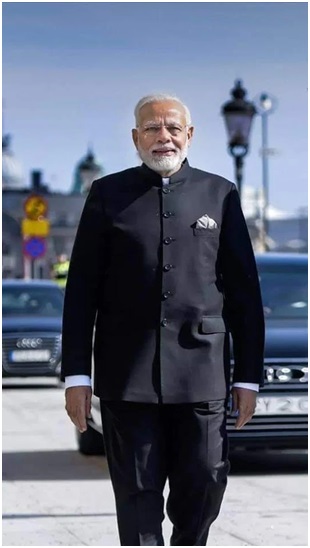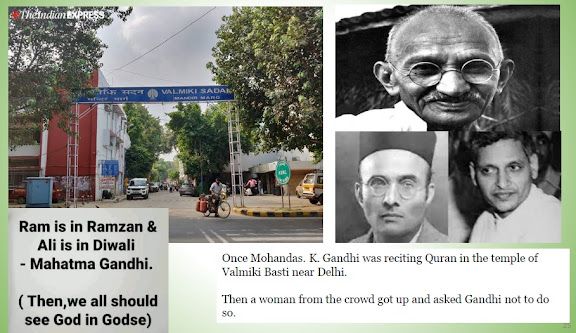INTERIM Budget 2019 – Innovative Visionary Budget with Missionary Zeal
Piyush Goyal, Interim Finance Minister, though
said to present an Interim Budget, had given a deadly shock just like ‘Economic Surgical Strike’ to all opposition
parties making them utterly confused ‘how to react and oppose the Budget of Modi?’.
Because the benefits were extended to almost all sections of the societies
like farmers having cultivable land up to 5 acres of land – with £ 6,000 per year as support cash
incentives to buy agricultural inputs such as fertilizers, seeds, etc.,
unorganized informal sector workers drawing a monthly salary of £ 15,000/- with
pension of £ 3000/- per month from the age of 60 years just paying an amount
ranging from £ 55/- to £ 100/- each month depending upon their age at the time
of joining the scheme, and above all, the honest taxpaying middle class earning
up to £ 5 lacs removed completely from tax liabilities and with full use of £ 1.5 lac exemption available under Section 80C of the Income Tax Act even those
earning annual income of £ 6.5 lacs need to pay no tax, had estopped all opposition party members.
If other exemptions announced in the Budget are taken into account, no tax
need to be paid upto £ 10 lacs approximately.
These benefits cover more than 12 crores farmers, 30-40 crores workers employed in the unorganized sector and around 3 crore middle class families.
Goyal had in his budget
speech acknowledged the contributions made by the middle class tax payers and
thanked them. This is the first time such encomiums were showered on the honest
middle class tax payers.
Goyal had further
confirmed that his Government had taken every steps to see that their tax money
was spent judiciously, honestly and wisely and that adequate steps had been
taken to remove middle men so that full benefits reached the targeted groups
with the introduction Direct Benefit Scheme using Digital India platform and
bank accounts with aadhar numbers to plug any
lapses and leakages.
As a tribute to Salaried Persons, they are also given further following
benefits in the people’s friendly budget:
•Standard deduction raised to £ 50,000/- from £ 40,000/- which will give additional tax benefit of £ 4700/-.
•Tax Deduction at Source (TDS) on
interest earned on bank/post office deposits raised from £ 10000/- to £ 40,000/-.
•TDS of tax on rent increased from £ 180000/- to £ 240000/-.
•No Notional rent for 2 houses – relief being provided considering the difficulty of the middle class
having to maintain families at two different locations on account of their
jobs, children’s education, or the care of parents.
Honesty of middle class people is trusted, as last year 99.54% of the
returns filed were accepted as they were filed. Budget promised that All income
tax returns will be processed in 24 hours and refunds issued simultaneously and
within the next 2 years, almost all verification and assessment of returns will
be done electronically thereby completely eliminating any personal interface
between taxpayers and tax officers.
Several incentives for home buyers, owners and real estate developers were
announced to give a boost to the real estate sector such as one in life time
capital gains under Section 54 of the Income Tax Act from investment in one
residential house to two for a tax payer with capital gains upto £ 2 crore, no payment of notional rent by builders for 2 years as it was estimated
that there are about 6.7 lac units lying unsold.
For
Capital market, stamp duty will be levied on 1 instrument relating to I
transaction that will be collected at stock exchange and then shared with the
particular State based on the buyer’s domicile and such a step will not
only help in simplicity of compliance but also in bringing down the overall
transaction cost.
For Defence and Home ministries, allocations
were around £ 3 lac crore and £ 1 lac crore respectively – an increase of 8% and 5% respectively in view of the border security and
internal law and order problem by equipping them with uptodate defence equipments and modernization of
police forces.
Similarly Railways get around £ 1.59 lac crore – the highest ever allocation.
Similarly, Micro, Small and Medium Enterprises (MSMEs) sector had got a 2%
interest subvention for loans up to £ 1 crore and to help the sector to market
their products, government had to buy at least 25% from MSMEs with a sub-clause
of procurement of 3% from women run organization under Government e Market (GeM).
The allotment of £ 750 crore to the Rashtriya Gokul Mission (RGM) is to develop Gokul Gram care centres for indigenous breeds of high
genetic merit with the objective to get native breeds to produce more milk and
to raise the quality of Indian cows and bulls to eventually outdo Jerseys and
Holsteins.
This budget should be specially appreciated for recognizing and
acknowledging the voiceless and very hard working unorganized sector employees.
They will be paid a monthly pension of £ 3000/- from the age of 60 years. It
is heartening to know this pension scheme to them, as their contributions in
building bridges, highways, railways, buildings, dams, railways etc. are the
backbone of all Governmental Developments. Though no one had ever demanded to
help such hard working employees, Modi Government had extended a helping
hand to such poor employees. The same spirit of humanitarian was extended to
nomadic communities by setting up a welfare development Board to help such most
deprived citizens.
Artificial
Intelligence being an important component of cyber physical system is now tied
to an existing programme called the National Mission on Interdisciplinary
Cyber-Physical Systems (NMICPS) having a total outlay of £ 3660/- crore for 5
years with an additional amount of £ 5 crore in the budget. It is expected to
create 40000 jobs in the short term and about 2 lacs in the long term.
Black Money (Undisclosed Foreign Income and Assets) and Imposition of Tax
Act, Fugitive Economic Offenders Act and Demonetization had compelled holders
of large cash currency to disclose their source of earnings. Due to these
measures, undisclosed income of about £ 1.3 lac crore apart from attachment of assets
worth about £ 50,000/- crore was achieved. Further benami assets worth £ 6,900 crore and foreign assets worth £ 1600 crore were attached. In all, 3.38 lac shell companies were detected and
de-registered and their directors disqualified.
Main objection raised by Rahul about this budget was that ‘I think it is an insult to the Indian farmer to turn around and tell him
that you are going to give him £ 17 a day; there could not have been
bigger insult than this.’
First of all the 6000/- annual amount payment is not for farmer’s daily maintenance and it is for agricultural inputs spread over to 3
seasons with the disbursement of £ 2000/- each which he can use it.
Further every amount of money has value. The assurance of something certain
coming to you gives a sense of confidence. Each family unit – of a married couple and their minor children – was eligible for the scheme. A household of 5 adult brothers jointly
owning a 10 hectare piece of land would receive £ 30,000 for the year. Farmers
holding cultivable lands upto 5 acres should not be portrayed as beggars – as if they had to depend completely
for their livelihood on freebees. But it is a fact that similar schemes in Teleganga and Odisha are paying more – and hence under Federal set up, it is upto State Governments to supplement the
Central Government assistance.
The Hindu Newspaper had headlined the budget as “SOP
OPERA” and in its editorial “Shopping for votes”, but strangely the contents
and tenor were not in tune with the sarcastic headlines and editorial contents.
Even the Hindu had published next to its Editorial an article written by by Ashima Goyal - a member of the
Prime Minister’s Economic Advisory Council under the heading ‘Distributing the
rewards of reform’.
The Hindu in its editorial had observed: ‘Though some
past governments have announced sops in their interim budgets with an eye on
elections, this budget has gone much further announcing very significant
measures. In political terms, the strategy cannot be faulted as it appears to
have put the opposition in a difficult spot – protesting too much about the
concessions given to those in distress may be counter-productive. That said,
some of these ideas may actually work in economic terms as they put money in
people’s hands.’
The important part of this budget was that it had spelt
out Vision 2030 for New India. Perhaps the goal is based on the Sustainable
Development Goals (SDGs) or 17 Global Goals set by the United Nations General
Assembly in 2015. The budget had listed 10 items with an ambitious goal to make
India a Developed Nation.
1.Infrastructure: To
build physical and social infrastructure for a “ten trillion dollar economy” in
the next 8 years and to provide ease of living.
2.Digital India - digital Infrastructure and digital
economy will be built upon the successes achieved in recent years in digitisation of Government
processes and private transactions.
3.Clean and green India - Besides making India a pollution
free nation, the government plans to drive the electric vehicle revolution.
4.Rural industrialization - To develop grass-roots level clusters, structures and
mechanisms encompassing the MSMEs, village industries and start-ups spread
across India.
5.Clean rivers - safe drinking water to all Indians,
sustaining and nourishing life and efficient use of water in irrigation using
micro-irrigation techniques.
6)Oceans and coastline - To tap into the ‘Blue Economy’ by
scaling up the Sagarmala project to develop
other inland waterways faster.
7)Space - Our space programme -- Gaganyaan, India becoming the launch-pad of satellites for the
World and placing an Indian astronaut into space by 2022.
8)Self-sufficiency in food production - To achieve
self-sufficiency in food in an organic way through modern agricultural
practices and value addition.
9)Health - To create a healthy society with an environment
of health assurance and the support of health infrastructure aiming to work
towards a distress free health care and a functional, and comprehensive
wellness system.
10)Minimum government, maximum governance - To have a
proactive and responsible bureaucracy which will be seen as friendly by the
people by 2030.
Goyal had said: In short, with this
comprehensive ten-dimensional Vision, we will create an India where poverty,
malnutrition, littering and illiteracy would be a matter of the past. India
would be a modern, technology-driven, high growth, equitable and transparent
society.
This
budget, as explained by an article in Economic Times, makes an effort to
balance the short – to medium-term objectives of the economy with a long-term
vision for 2030.
Hence
we have termed this Budget as a visionary one with setting clear goals which Modi
Government’s Team India is confident to achieve in record time with missionary
zeal.
Modi Development Agenda coupled with 10% reservation for
Economically Weaker Section in General Category plus people’s friendly
incentive oriented Budget especially No Tax upto 5 lacs for salaried employees, annual support income of £
6000/- to farmers and pension of £ 3000 for unorganized sector workers etc. are
enough to win 2019 Lok Sabha election with
thumbing majority.
Modi’s move to Supreme Court which is not serious to hasten
the process of hearing the Ram Janma Bhoomi Land dispute Case,
had filed an affidavit to hand over the undisputed land surrounding the
disputed site to the rightful owners and VHP declaring that this is a right
move by Modi Government and they
will not do anything to disturb the present status till the Lok Sabha election and also
urging all to vote for Modi Government – are all
good tidings and signs for Modi to Win 2019 with thumping majority – more than what Modi had achieved in 2014
Lok Sabha election.
Bharath Mathaki Jai! Vanthe Matharam









Comments